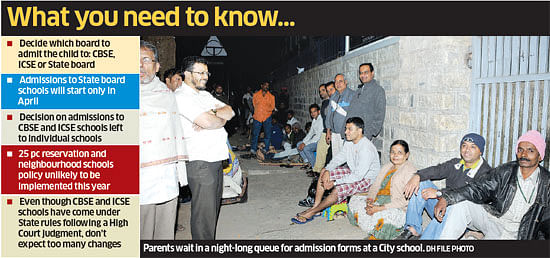
But this year, with the Right to Education (RTE) Act looming large, there has been utter confusion over what parents are to do. The confusion has been compounded with the recent high court judgment that brings CBSE and ICSE schools under the purview of the State government.
So does the State government regulate admissions to all schools? How are admissions to be conducted? How are fees to be fixed?
Besides such questions, parents also have to figure out other academic issues: Which board should they send their child to? What medium of instruction should they opt for?
Admission confusion
Until last year, admissions to state syllabus schools were regulated by the State
Department of Education, while CBSE and ICSE schools were largely unregulated.
Under the RTE, supervision of all schools, including CBSE and ICSE schools, will come under State jurisdiction.
However, transition troubles from the old regime to the new one has left many parents confused. While the Union Government has notified RTE, the State is yet to notify rules.
Preetham Shetty, an IT Manager residing in RT Nagar, is currently looking to admit his five-year-old son Nitin to class one. “We read in the newspapers that the Right to Education will come into effect from the upcoming year. Yet, every school I have
approached says that they have no idea about whether RTE will be implemented this year or not,” he says.
One of the reasons for the confusion is the lack of resolution over fund-sharing between the State and Union Governments. Primary and Secondary Education Minister Vishweshwara Hegde Kageri says: “We are in discussion with the Central government about funding. We want the Centre to take the additional burden due to the implementation of the Right to Education Act.”
Once the RTE is notified, the admission process will be a regulated affair. Schools will not be allowed to screen children, preference will be given to students living in the vicinity of the school, and 25 per cent of seats will be reserved for students from poor and backward communities.
Jurisdiction confusion
The other major cause of confusion in recent days is the High Court judgment, which had struck down a provision exempting CBSE and ICSE schools from the control of the State government. Until the judgment, the State Education Department’s jurisdiction extended to reviewing the admission policy and fee structure of only schools affiliated to it.
However, on a writ petition filed by parents whose children study at a CBSE school, the High Court said both CBSE and ICSE schools would be subject to the State government’s orders. The department has been slow to react to the judgment.
Sridevi S A, president of Bangalore Sahodaya, an association of CBSE schools in Bangalore, said the association was yet to receive a notification. “No official from the State Education Department has visited us or informed us if we come under the State rules,” she says. “Right now, every school follows its own set of rules to admit students,” she adds.
The lack of regulation and supervision of CBSE and ICSE schools has been the source of the largest number of complaints from parents. While the state board schools are mandated to begin admissions only when the government notifies them, CBSE and ICSE schools are free to do as they please. “Every CBSE school has its own set of regulations on admission. The only requirement is that students admitted to class one should not be less than five years old,” says Sridevi.
Indeed such lack of regulation within CBSE and ICSE schools is the problem facing parents. Many CBSE and ICSE schools have been found to start admissions as early as September — nine months before the classes actually start.
'Overt interference unhealthy'
But the other point of view emerging from schools is that overt interference in the affairs of schools is not a good thing. G S Sharma, president of the Karnataka Unaided Schools Management Association, and the man widely credited with having fought the medium of instructions issue successfully in court, said the government had contradictory policies when it came to schools.
“For instance, under the Right to Education Act, students cannot be denied admission any time of the year. At the same time, the Education Department has sent us a notice saying we should not admit students before April 15,” he said. “Where is the consistency in all this,” he asks.
Neighbourhood schools
The other major change that the Right to Education envisages is the concept of neighbourhood schools. Children from the neighbourhood will be given preference over other students during admission.
However, the question as to what constitutes neighbourhood still needs to be answered. The Agenda for Bangalore Infrastructure and Development (ABIDe) task force has suggested that in urban areas such as Bangalore, ward boundaries can be utilised to determine the neighbourhood of a school. In rural areas, the neighbourhood will necessarily be a much larger area.
Lack of fee regulation
The other major source of irritation for parents looking to admit students is the lack of any institutional mechanism to monitor fees. Currently, schools affiliated to the State board are supposed to follow a formula based on the number of students and their salary expenditure.
However, it is an open secret that no school follows these regulations. Even the monitoring authorities envisaged under the rules are non-functional. An official in the Education department says: “In rural areas, it will be possible for us to monitor as there are fewer schools. But in urban areas, effective monitoring will be almost impossible.”
The Right to Education Act envisages monitoring of school’s accounts books by the School Management Committee — a body that comprises mostly parents. This might be a more effective way of regulating fees than the current one.
Ultimately, parents can look forward to a harrowing time this year, as the State government and schools change to a system mandated by the Right to Education Act.
